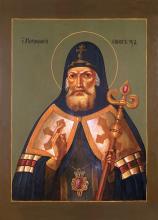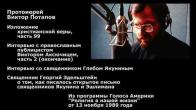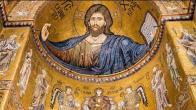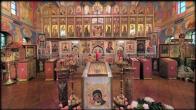You are here
St. Metrophanes, bishop of Voronezh
23 November / 6 December
 Holy Hierarch, Bishop of Voronezh Metrophanes, in the world Michael, was born on November 8, 1623. In the Holy Hierarch’s diptych of commemorations, the list of names begins with people in the priestly rank; this provides grounds to conclude that he was born into a family with a priestly heritage. From Holy Hierarch Metrophanes’ Spiritual Will and Testament, we know that he “was born to pious parents and was raised by them in the unblemished piety of the Eastern Church, in the Orthodox Faith.” Until he was forty years of age, the Holy Hierarch lived in the world: he was married, had a son named John, and served as a parish priest. Priest Michael served in the village of Sidorovskoe, near the town of Shui, which is now in the Province of Vladimir.
Holy Hierarch, Bishop of Voronezh Metrophanes, in the world Michael, was born on November 8, 1623. In the Holy Hierarch’s diptych of commemorations, the list of names begins with people in the priestly rank; this provides grounds to conclude that he was born into a family with a priestly heritage. From Holy Hierarch Metrophanes’ Spiritual Will and Testament, we know that he “was born to pious parents and was raised by them in the unblemished piety of the Eastern Church, in the Orthodox Faith.” Until he was forty years of age, the Holy Hierarch lived in the world: he was married, had a son named John, and served as a parish priest. Priest Michael served in the village of Sidorovskoe, near the town of Shui, which is now in the Province of Vladimir.
In 1633, after the death of his spouse, Priest Michael accepted tonsure, taking the name Metrophanes, in the Zolotinkov Hermitage. After three years of monastic live, Hieromonk Metrophanes was chosen to be Abbot of the Monastery of St. Cosmas in Yakhromsk. In directing that monastery for 10 years, he showed himself to be a dedicated rector. Through his efforts, a church dedicated to the Icon Not-made-by-hands of the All-merciful Savior was erected there.
Patriarch Joachim (1674-1690) learned of Holy Hierarch Metrophanes’ great piety, and in 1675 elevated him to the dignity of Archimandrite of the St. Makary-Unzhensk Monastery. There, through the Saint’s efforts, a church and bell tower, dedicated to the Annunciation, were erected. On April 2, 1682, Patriarch Joachim and 16 bishops consecrated St. Metrophanes to be Bishop of Voronezh.
The beginning of Holy Hierarch Metrophanes’ Episcopal service coincided with Russia’s time of troubles and church schism. The first thing the Holy Hierarch did after his arrival in Voronezh was to send the pastors of his diocese an encyclical in which he appealed for his flock to undertake moral correction. The Hierarch wrote, “Reverend priests of the Most-high God! Leaders of Christ’s flock! To guide others along the right path you must have bright, intelligent eyes, enlightened by the light of discernment. As the Lord said, you must be light itself: you are the light of the world (Matthew 5: 14)... in entrusting the flock to His Apostle, Christ the Savior said “feed [the flock]” to him thrice, as if to emphasize that there are three types of feeding the flock: through words of instruction, through prayer with the help of the Holy Mysteries, and through the example of one’s life. Employ all three means: give people an example of good life, teach the people, and pray for them, strengthening them by the Holy Mysteries; in particular you should enlighten those lacking faith, through Holy Baptism, and you should bring those who have sinned to repentance. Be attentive to the sick, so that they not depart from this life without communing of the Holy Gifts and Holy Unction.”
Holy Hierarch St. Metrophanes began his archpastoral activities by replacing an old wooden church with a new cathedral church dedicated to the Annunciation to the Most-holy Theotokos. In 1692, the cathedral, with side chapels to the Archangel Michael and Holy Hierarch St. Nicholas, was consecrated. During St. Metrophanes’ 20 years of Episcopal service, the number of churches in his diocese grew from 182 to 239, and 2 monasteries were established. In the existing monasteries, he strove to root out dissention and disorder and to institute a strict way of life in accordance with the monastic rule.
The Holy Hierarch of Voronezh zealously looked after the needs of the flock. He comforted rich and poor alike, was a helper to widows and orphans and an intercessor for those who had been wronged. His house was a refuge for strangers and a hospital for the sick. He prayed for deceased Christians as well as for the living; he listed in his commemoration book, and prayed especially for, soldiers who had fallen for the Homeland. Commemorating them at the Proskomedia, St. Metrophanes would say, “If a soul be righteous, may it be made worthy of a greater reward; if it be sinful, may it be a partaker of God’s mercy.”
Holy Hierarch St. Metrophanes’ great friendship with Holy Hierarch St. Pitirim, Bishop of Tambov (commemorated July 28), is well known. They not only corresponded, but also met to discuss spiritual matters.
An ardent patriot, Holy Hierarch St. Metrophanes understood quite well what Peter I had set as his goals and what he critically needed; and with his moral authority, charity, and prayers, collaborated in that needed transformation. St. Metrophanes urged the people to assist Peter I in every way possible in construction of a fleet in Voronezh for the Azov Campaign. That was especially important, for many considered the building of a fleet a pointless exercise. The Holy Hierarch not only officered advice to the Tsar, but also rendered material support to the government treasury, which was in need of money to build the fleet; he gave up all of his resources, recognizing that they were going for the good of the Homeland.
Because the patriotic feelings in the Holy Hierarch’s soul were joined with an unshakable faith and strictness of Orthodox convictions, he was not afraid of angering the Tsar. Thus, the Saint refused to go to see Peter I in his palace, on the grounds that in it there stood statues of pagan gods; although disobeying the Tsar’s orders brought him the threat of disfavor and disgrace, he remained resolute. Peter ordered the statues to be removed, and from that point held the Holy Hierarch in even greater esteem.
St. Metrophanes reposed at a very advanced age, in 1703. Before his death, he was tonsured into the great Schema, with the name Makary. His funeral was held on December 4. Tsar Peter I himself carried the coffin from the cathedral to the crypt. In saying goodbye, the Tsar said, “I am now bereft of such a holy elder. May his memory be eternal.” One of the remarkable memorials of the life and work of St. Metrophanes is his Spiritual Will. In it he said, “By God’s will, I have reached old age and now my natural strength is exhausted. Accordingly, I have decided to write this, my final writing… When my sinful soul is loosed from its bond to the body, I entrust it to the benevolence of the Most-wise God, its creator, that he might receive it kindly, as the work of His hands; my sinful bones I bequeath to the mother of all, and look forward from there to the resurrection of the dead.” Further on, addressing his pastors and flock, the Holy Hierarch said, “A simple man will answer to God only for his own soul, but a priest will be tortured on account of many, as one who did not care for the sheep from which he collected milk and wool…. Here is a rule given by wise men, for all people: be industrious and measured [maintain a sense of proportion], and you will be rich. Show temperance in drinking, eat little, and you will be healthy. Do good and avoid evil, and you will be saved.”
Relics in cathedral - monthly calendar
| S | M | T | W | T | F | S |
|---|---|---|---|---|---|---|
|
1
|
2
|
3
|
4
|
5
|
6
|
7
|
|
8
|
9
|
10
|
11
|
12
|
13
|
14
|
|
15
|
16
|
17
|
18
|
19
|
20
|
21
|
|
22
|
23
|
24
|
25
|
26
|
27
|
28
|
|
29
|
30
|
31
|
|
|
|
|
PARISH LIFE
Address of our Cathedral
While all the materials on this site are copyrighted, you may use them freely as long as you treat them
with respect and provide attribution on the Russian Orthodox Cathedral of St.John the Baptist of Washington DC.









